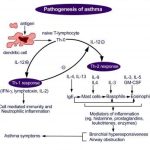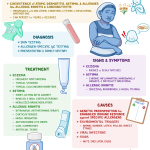The air we breathe is a fundamental necessity for life, yet millions of people around the world struggle to take a full and healthy breath. Atopy, a cluster of conditions characterized by allergic reactions to environmental substances, affects approximately 20% of adults and 40% of children worldwide. Beyond asthma, atopy encompasses a range of conditions that can significantly impact quality of life, from mild discomfort to debilitating chronic illness.
Understanding Atopy: Why It Matters
Avoiding the common misconception that atopy is solely an allergy issue, we will delve into the complexities of this multifaceted condition. As we explore the world beyond asthma, it becomes clear that understanding atopy is crucial for developing effective treatments and improving patient outcomes.
The Impact of Atopy on Daily Life
Atopic diseases can manifest in various ways, from mild symptoms like itching or sneezing to severe reactions such as anaphylaxis. The physical toll of these conditions is evident, but it’s equally important to consider the emotional and psychological strain they impose. For instance, individuals with atopic dermatitis may experience social anxiety due to skin lesions, while those with atopic rhinitis might struggle with fatigue and cognitive impairment.
This marks just the beginning of our comprehensive guide to understanding atopy. In the following sections, we will examine the various types of atopic conditions, explore their underlying causes and triggers, discuss diagnosis and treatment options, and highlight emerging research and breakthroughs in the field.

Understanding Atopy: Beyond Asthma – A Comprehensive Guide
The Impact of Atopy on Daily Life
Atopic diseases can manifest in various ways, from mild symptoms like itching or sneezing to severe reactions such as anaphylaxis. The physical toll of these conditions is evident, but it’s equally important to consider the emotional and psychological strain they impose.
For instance, individuals with atopic dermatitis may experience social anxiety due to skin lesions, while those with atopic rhinitis might struggle with fatigue and cognitive impairment. Similarly, people living with atopic gastrointestinal disorders like eosinophilic esophagitis (EoE) may face challenges in maintaining a healthy diet or managing the emotional impact of chronic abdominal pain.
Moreover, atopic conditions can have a profound impact on mental health. Studies have shown that individuals with untreated atopic dermatitis are more likely to experience depression and anxiety compared to those with controlled symptoms. It’s essential to recognize the far-reaching consequences of atopy beyond just physical discomfort.
The Role of Genetics in Atopy
While environmental factors play a significant role in triggering atopic reactions, genetics also plays a crucial part in determining an individual’s susceptibility to these conditions. Research suggests that genetic variations can increase the risk of developing atopic diseases by altering the body’s immune response or modifying the way it interacts with environmental triggers.
A prime example is the association between certain genetic markers and the development of atopic dermatitis. Studies have identified specific gene variants linked to an increased risk of this condition, which can inform diagnosis and treatment strategies. By understanding the genetic underpinnings of atopy, healthcare professionals can develop more effective treatments tailored to individual patient needs.
As we continue to unravel the complexities of atopy, it becomes increasingly clear that a comprehensive approach is necessary to address these conditions effectively. In our next section, we will delve into the various types of atopic conditions and explore their underlying causes and triggers.
Learn more about atopic dermatitis from Mayo Clinic.
Explore the genetics of atopy on National Institute of Allergy and Infectious Diseases’ website.
Get Personalized Guidance from Medical Experts
We are ready to answer your questions, day or night.
Start chatIn conclusion, understanding atopy goes beyond just asthma or allergies – it requires a nuanced comprehension of the complex interplay between genetic predisposition, environmental triggers, and individual experiences. By recognizing the multifaceted nature of atopic conditions, we can better support those affected and work towards developing more effective treatments.
As we’ve explored throughout this comprehensive guide, atopy is not just a collection of symptoms or diseases – it’s a journey that requires empathy, education, and collaboration. By embracing the complexities of atopy, we can empower individuals to take control of their health, reduce the stigma surrounding these conditions, and ultimately improve quality of life.
As we continue to advance our knowledge of atopy, it’s crucial to prioritize patient-centered care, advocate for increased research funding, and promote awareness about the diverse range of atopic conditions. Together, we can create a more inclusive and supportive environment for those affected by atopy, ultimately paving the way for better outcomes and improved well-being.
In conclusion, understanding atopy is not just a matter of science – it’s an act of compassion, empathy, and commitment to improving human health. By embracing this comprehensive guide, we hope to inspire a new era of collaboration, innovation, and hope for those affected by atopy.
The Dangers of Fatty Liver: A Wake-Up Call: Do you know the risks associated with fatty liver due to excessive alcohol consumption? Our article reveals the warning signs and symptoms, empowering you to take control of your health. Read now and make a positive change!
Your Online Retail Experience: Answered: Curious about our online store policies, shipping, or returns? We’ve got you covered! Our FAQs will provide the clarity and confidence you need to shop with us. Start exploring now!




